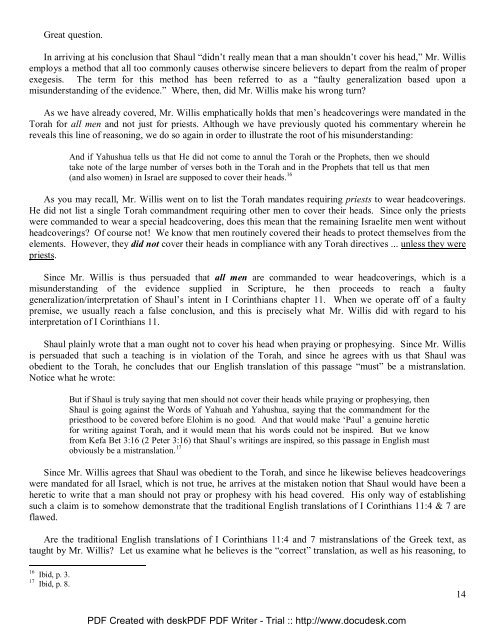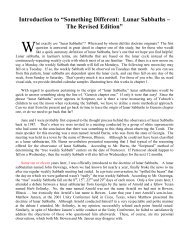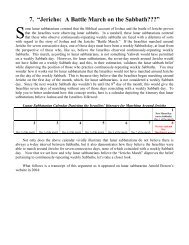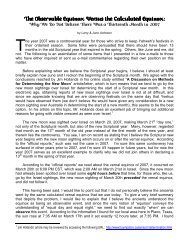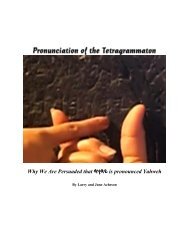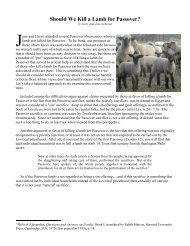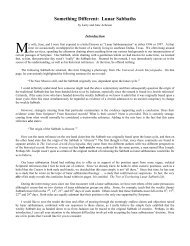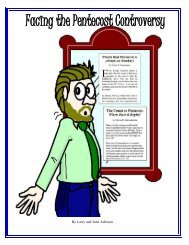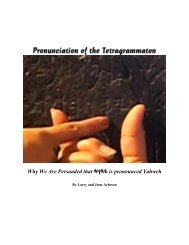Should a Man Cover His Head When Praying Web Version
Should a Man Cover His Head When Praying Web Version
Should a Man Cover His Head When Praying Web Version
Create successful ePaper yourself
Turn your PDF publications into a flip-book with our unique Google optimized e-Paper software.
Great question.<br />
In arriving at his conclusion that Shaul “didn’t really mean that a man shouldn’t cover his head,” Mr. Willis<br />
employs a method that all too commonly causes otherwise sincere believers to depart from the realm of proper<br />
exegesis. The term for this method has been referred to as a “faulty generalization based upon a<br />
misunderstanding of the evidence.” Where, then, did Mr. Willis make his wrong turn<br />
As we have already covered, Mr. Willis emphatically holds that men’s headcoverings were mandated in the<br />
Torah for all men and not just for priests. Although we have previously quoted his commentary wherein he<br />
reveals this line of reasoning, we do so again in order to illustrate the root of his misunderstanding:<br />
And if Yahushua tells us that He did not come to annul the Torah or the Prophets, then we should<br />
take note of the large number of verses both in the Torah and in the Prophets that tell us that men<br />
(and also women) in Israel are supposed to cover their heads. 16<br />
As you may recall, Mr. Willis went on to list the Torah mandates requiring priests to wear headcoverings.<br />
He did not list a single Torah commandment requiring other men to cover their heads. Since only the priests<br />
were commanded to wear a special headcovering, does this mean that the remaining Israelite men went without<br />
headcoverings Of course not! We know that men routinely covered their heads to protect themselves from the<br />
elements. However, they did not cover their heads in compliance with any Torah directives ... unless they were<br />
priests.<br />
Since Mr. Willis is thus persuaded that all men are commanded to wear headcoverings, which is a<br />
misunderstanding of the evidence supplied in Scripture, he then proceeds to reach a faulty<br />
generalization/interpretation of Shaul’s intent in I Corinthians chapter 11. <strong>When</strong> we operate off of a faulty<br />
premise, we usually reach a false conclusion, and this is precisely what Mr. Willis did with regard to his<br />
interpretation of I Corinthians 11.<br />
Shaul plainly wrote that a man ought not to cover his head when praying or prophesying. Since Mr. Willis<br />
is persuaded that such a teaching is in violation of the Torah, and since he agrees with us that Shaul was<br />
obedient to the Torah, he concludes that our English translation of this passage “must” be a mistranslation.<br />
Notice what he wrote:<br />
But if Shaul is truly saying that men should not cover their heads while praying or prophesying, then<br />
Shaul is going against the Words of Yahuah and Yahushua, saying that the commandment for the<br />
priesthood to be covered before Elohim is no good. And that would make ‘Paul’ a genuine heretic<br />
for writing against Torah, and it would mean that his words could not be inspired. But we know<br />
from Kefa Bet 3:16 (2 Peter 3:16) that Shaul’s writings are inspired, so this passage in English must<br />
obviously be a mistranslation. 17<br />
Since Mr. Willis agrees that Shaul was obedient to the Torah, and since he likewise believes headcoverings<br />
were mandated for all Israel, which is not true, he arrives at the mistaken notion that Shaul would have been a<br />
heretic to write that a man should not pray or prophesy with his head covered. <strong>His</strong> only way of establishing<br />
such a claim is to somehow demonstrate that the traditional English translations of I Corinthians 11:4 & 7 are<br />
flawed.<br />
Are the traditional English translations of I Corinthians 11:4 and 7 mistranslations of the Greek text, as<br />
taught by Mr. Willis Let us examine what he believes is the “correct” translation, as well as his reasoning, to<br />
16 Ibid, p. 3.<br />
17 Ibid, p. 8.<br />
14<br />
PDF Created with deskPDF PDF Writer - Trial :: http://www.docudesk.com


